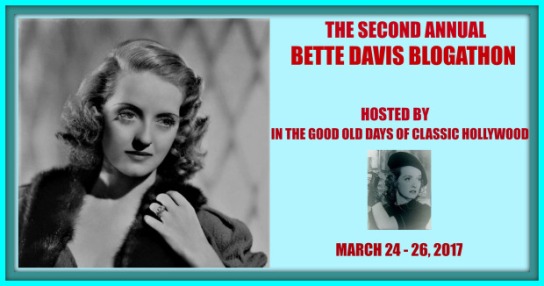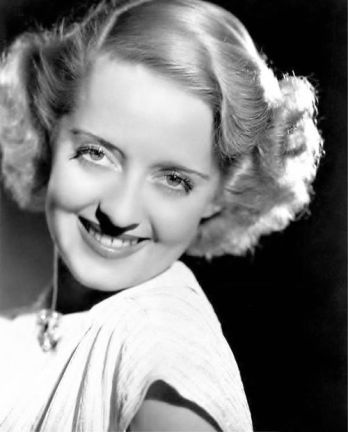
Bette Davis was one of the most iconic and talented actresses to ever grace the silver screen. She’s remembered for her strong personality, her impressive tact, her unique eyes and, of course, all those classics she starred in such as Jezebel, All About Eve, Now Voyager and many others. Except for the fact that she’s a timeless personality, she’s now significantly and symbolically back in our contemporary world with the new TV show Feud about the making of Whatever Happened to Baby Jane? and her difficult relation with Joan Crawford, her co-star and rival.

In order to celebrate the “inimitable Bette Davis” as she calls her, my friend Crystal from In the Good Old Days of Classic Hollywood is back this weekend with her 2nd annual Bette Davis Blogathon. We are highly thrilled to participate in the event as Mrs. Davis certainly is a worthy subject.

***
We can remember Bette Davis for the three collaborations she made with William Wyler, including one for which she won the Best Actress Oscar: Jezebel. While I’m not sure how I feel about this one and while The Little Foxes left me cold, The Letter is, without the shadow of a doubt, my favourite one.

The Letter was the second collaboration between Wyler and Davis. The film was released in 1940 and was a screen adaptation of W. Somerset Maugham’s 1927 play. The film received no less than seven Oscar nominations (but unfortunately didn’t win any of them): Best Picture, Best Director (William Wyler), Best Actress (Bette Davis), Best Supporting Actor (James Stephenson), Best Original Music Score (Max Steiner), Best Editing (Warren Low), Best Cinematography: Black and white (Tony Gaudio).
***
The Letter starts loudly with a series of ferocious gun bangs. Leslie Crosbie (Bette Davis) has just killed a man. She lives on a Malayan plantation with her British husband, Robert (Herbert Marshall), a plantation manager. He is not here when the drama takes place, but he arrives not soon after. The man Leslie has killed is Geoff Hammond (David Newell), a friend of the family. After calming down, Leslie explains to her husband, the police and her lawyer, Howard Joyce (James Stephenson) what happened: Hammond tried to abuse her and she killed him in simple self-defense. Obviously, she has nothing to be blamed for. However, serious doubts about Leslie’s version of the facts start haunting Joyce’s mind when he is informed that a letter written by Leslie to Geoff is now in possession of Geoff’s Eurasian widow (Gale Sondergaard). The letter was written the night Hammond died and Leslie was asking him to come see her. Mrs. Hammond requires $10 000 to give it back.
***
Bette said of The Letter that it was a “magnificent picture” (IMDB) and we feel that, despite a few disagreements she could have had with Wyler while making the film, she gave the best of herself and the result was a most memorable performance. Well, there’s that non-written rule that being in a William Wyler’s film almost assures you a place among the Oscar nominees. What I like about this performance, is that we see a bit of everything Davis. Sure, at the beginning, she’s the Bette Davis who stands up for her own rights and acts spontaneously without really thinking. She’s the 20th-century woman who is not scared to defy the opposite sex. This opening shot, of Bette David shooting Hammond is not only one of the best in film history because it happens so suddenly, but also because of Bette Davis’ acting games: she doesn’t have to say anything to make us feel her rage; her furious gaze, her determined gestures do all the job. Bette uses her usual theatricality in this role, but she manages to balance it well and her performance remains one worthy of the cinematic world. Despite the fact that she portrays a rather ambiguous character, it’s easy to become fond of Bette Davis in The Letter. She is presented in a favourable light and the worst we could feel for her is pity. What I also like about this performance is that Bette expresses a beautiful sensibility. The way she talks, the way she reacts, her interactions with the other actors/characters are all for it.
Because yes, despite being excellent in her role, Bette is also excellent at sharing the screen with the others. We feel a strong connection between her and her husband played by the marvellous Herbert Marshall. We feel that, despite the curse of the event, they’ll be ready to fight for each other’s love, until… a fatal declaration is abruptly made by Bette. There’s an interesting opposition created by Bette and Gale Sondergaard who plays Hammond’s widow. While Bette is often the strongest woman of the lot, the one others fear, here, it’s the opposite: she is totally oppressed by Mrs. Hammond’s authority and hate for her. This adds something original and unforgettable in Bette’s career. Finally, one of the most interesting character relation could be the one between Leslie and her lawyer, Howard Joyce. Because he knows more than the others know about the murder, their interactions create a delicious suspense throughout the film. The tension is omnipresent in their discussions and we feel everything between them could change abruptly.
It’s for all these reasons, and probably many other that I didn’t think of writing, that Bette Davis gave one of her best performances in The Letter.
***
If I mainly wanted to focus on Bette Davis in this article, there’s one element of the film I cannot skip writing about, and this is the cinematography. It’s not surprising that the film was nominated in this category at the Oscars. Well, the competition was hard since it competed against Hitchcock’s Rebecca, who finally won the award (and that was deserved). William Wyler and cinematographer Tony Gaudio knew perfectly how to create a connection between the image and the narrative elements. For example, at the beginning, the camera shows the plantation where the Malaysian workers sleep. The night is filmed in an impressive sharpness, and these images could almost inspire a poet. Then, after Leslie has killed Hammond, the camera focuses on the sky, and what we see is an image to remember: the moon is slowly swallowed by the grey clouds. This sinister vision could easily symbolize the fact that something tragic just happened.
Let’s take a look at this scene:
For its visual dimension, The Letter could easily be categorized as a Film Noir. Indeed, Gaudio likes to play with the shadows in several shots as you can see it here:
Gaudio successfully manages to transpose this idea of Film Noir in an exotic environment. Bette adds her touch of orientalist when she wears that beautiful white veil made of lace when she meets Mrs. Hammond. This veil almost seems to shine in the night but has to compete with Mrs. Hammond blinding jewels.
The Letter, despite being a dark story, is presented to us in a bright and elegant visual way.
***
There will be much more to develop about The Letter, but I will leave this to the experts or those who benefit from more precious free time than I do (stuuuuudent life!).
Many thanks to Crystal for allowing me to write about the spellbinding film that The Letter is. Obviously, Bette can be celebrated for many other reasons, many other roles and it’s what you’ll discover by exploring the other entries of The Second Annual Bette Davis Blogathon by clicking here.
See you!









![b4512e67c2b8d48877d7400223d048a4 Title: LETTER, THE (1940) ¥ Pers: DAVIS, BETTE ¥ Year: 1940 ¥ Dir: WYLER, WILLIAM ¥ Ref: LET021BA ¥ Credit: [ WARNER BROS / THE KOBAL COLLECTION ]](https://thewonderfulworldofcinema.files.wordpress.com/2017/03/b4512e67c2b8d48877d7400223d048a4.jpg?w=174&resize=174%2C241&h=241#038;h=241)




Nice review, Virginie. I Think it is one of her best performances. To me one of her maybe top 5. Also liked your comments on the cinematography. Will have to check that out again.
LikeLiked by 2 people
Thanks Mike! 🙂
LikeLike
Great review! Bette is just splendid in this role, and it deserves a much-needed rewatch. I totally agree with what you said about how it could be a noir. It has all of the necessary elements.
LikeLiked by 1 person
“Splendid” is the right word! Thanks for your kind feedback 🙂
LikeLiked by 1 person
[…] The Wonderful World Of Cinema: The Letter ( 1940 ) […]
LikeLike
Loved reading this review. Davis and Marshall are both sublime in this. One of Bette’s best performances.
LikeLiked by 1 person
I’m glad you pointed out the cinematography. When I saw this movie for the first time with my mom, she commented that it’s a great example of why black and white films matter — it’s so gorgeous and expressive and it achieves something color couldn’t.
Good observation about Bette’s performance showing her full range. I never thought of it, but you’re right. She gets to be tough, vulnerable, manipulative, scared, and more. Great job!
LikeLiked by 1 person
The Letter is also my favorite Davis / Wyler film. It’s so thrilling and surprising! I also love the cinematography – sometimes referred to as proto-noir, and the dynamics between Bette’s and Gale’s characters. Wonderful review!
Kisses!
Le
LikeLiked by 1 person
Thanks Le! “Proto-noir”, I’ve never heard of this term before! Interesting! 😀
LikeLiked by 1 person
Great post! The Letter is one of my favorite Bette Davis movies.
I would love for you to add it to the Classic Movie Marathon link party that launched last night. http://classicmovietreasures.com/classic-movie-marathon-link-party-premiere/
LikeLiked by 1 person
Really enjoyed your review! I agree – one of her very best performances! The film just crackles with tension…and all those create interpersonal dynamics between the characters you pointed out.
It’s amazing to think the film didn’t win a single award!
LikeLiked by 1 person
Yes, that’s pretty shocking, isn’t it? Thanks for the kind comment! I’m glad you appreciated my article 🙂
LikeLiked by 1 person
[…] The Letter (William Wyler, […]
LikeLike
A fantastic and atmospheric movie. Loved how Davis was so calculating but knew how to manipulate those around her into thinking she was the victim. Man, that opening scene was so well executed(pardon the pun).
LikeLiked by 1 person
Thanks so much for participating in the blogathon Virginie, and sorry for the late reply. I love “The Letter”, especially for its cinematography. I’m interested to see the original version of the film. Great post. Keep up the good work.
LikeLiked by 1 person
Thanks Crystal! Yes I’ll also be curious to see the original version
LikeLike
[…] event for many years to come! After having discussed Bette Davis performances in All About Eve, The Letter, and Now, Voyager, this year, I’ve decided to explore what is considered to be Bette’s […]
LikeLike
[…] The Letter (William Wyler, […]
LikeLike